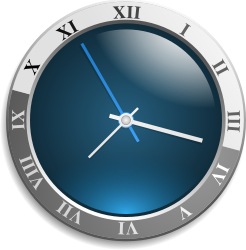
cron: The Unix clock daemon that executes
commands at specified dates and times according to
instructions in a "crontab" file.
Image from
openclipart.org.
Drupal is an amazing system, there is no denying it. Every once in a while, however, small problems come up that no one anticipates, and your entire system grinds to a halt. This recently happened with me when needing for Drupal to run some heavy processes in cron. It croaked. Drupal got stuck in a loop of trying to run the same ill-fated task over and over, and my site stopped updating. Drupal needs cron, and all the normal ways of running cron were failing me.
Cron is an interesting creature. Many new sysadmins are mystified by its cryptic symbology and voodoo-like power, so they avoid it. Some shared hosting environments don't even allow users to set cron jobs! Back in the old days (Drupal 5 & 6), we solved this problem by using the Poorman's Cron module, which worked by starting the cron jobs at the end of a page load, after information was already sent to the user. It was virtually transparent to the end user, and this method was so popular that it made its way into Drupal 7 as a core module.





